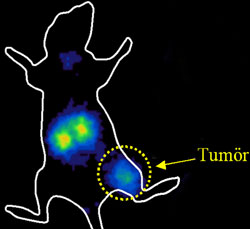New target-seeking molecule offers hope of better cancer treatment

The gamma camera image shows the distribution of radioactivity in a mouse given target-seeking affibody molecules marked with radioactivity. The uptake can be seen in the thyroid gland, the kidneys, and the tumor.
A new target-seeking affibody molecule can be used to visualize cancer tumors and to treat them. This has been shown in a dissertation by Ann-Charlott Steffen to be publicly defended at Uppsala University on April 22.
Every third Swede is estimated to receive a cancer diagnosis sometime in their lives, and nearly one Swede in four dies as a result of the disease. The need for improved detection and treatment of the disease is great.
Existing treatments include surgery, chemotherapy, and radiation. Surgery is most effective for large, well-defined tumors, but if the disease has spread, chemotherapy and/or radiation are needed. These forms of treatment affect all dividing cells, leading to toxic effects on healthy tissue. This toxicity limits the size of the dose that can be given, thereby also limiting the probability that the disease will be cured. By seeking out tumor cells and selectively delivering cytostatics or radiation to the cancer cells, the dose affecting healthy tissue can be reduced and the dose to the tumor can be increased. This improves the chances of curing the disease.
Ann-Charlott Steffen and her associates have developed an affibody molecule that binds to the protein HER-2, which primarily occurs in cancer cells from patients with aggressive forms of breast cancer. The scientists have attached radioactivity to the affibody molecules, so that they can visualize tumors and metastases and also treat tumors with the local dose of radiation provided by this radioactivity.
Ann-Charlott Steffen shows that the HER-2-binding affibody molecules attach to cancer cells with the HER-2 target on their surface, both in cell cultures and in mouse tumors. The research team has also found that the radioactivity in mouse tumors can be used to make these tumors visible in a gamma camera (see picture). Moreover, the results show that the radioactivity delivered by the affibody molecules can be used to kill tumor cells in cell cultures.
Affibody molecules are tiny, which enables them to enter tumors and be rapidly distributed in the body, unlike antibodies, which are normally used in target-seeking therapy and visualization. What’s more, affibody molecules are relatively easy to develop for virtually any target and can therefore in all probability be used for visualizing and treating many different forms of cancer.
“I hope these findings will lead to new possibilities of visualizing and treating distributed tumor diseases so that more cancer patients will be able to survive,” says Ann-Charlott Steffen.
Media Contact
More Information:
http://info.uu.se/press.nsf/pm/new.targetseeking.idAE4.htmlAll latest news from the category: Health and Medicine
This subject area encompasses research and studies in the field of human medicine.
Among the wide-ranging list of topics covered here are anesthesiology, anatomy, surgery, human genetics, hygiene and environmental medicine, internal medicine, neurology, pharmacology, physiology, urology and dental medicine.
Newest articles

Silicon Carbide Innovation Alliance to drive industrial-scale semiconductor work
Known for its ability to withstand extreme environments and high voltages, silicon carbide (SiC) is a semiconducting material made up of silicon and carbon atoms arranged into crystals that is…

New SPECT/CT technique shows impressive biomarker identification
…offers increased access for prostate cancer patients. A novel SPECT/CT acquisition method can accurately detect radiopharmaceutical biodistribution in a convenient manner for prostate cancer patients, opening the door for more…

How 3D printers can give robots a soft touch
Soft skin coverings and touch sensors have emerged as a promising feature for robots that are both safer and more intuitive for human interaction, but they are expensive and difficult…





















